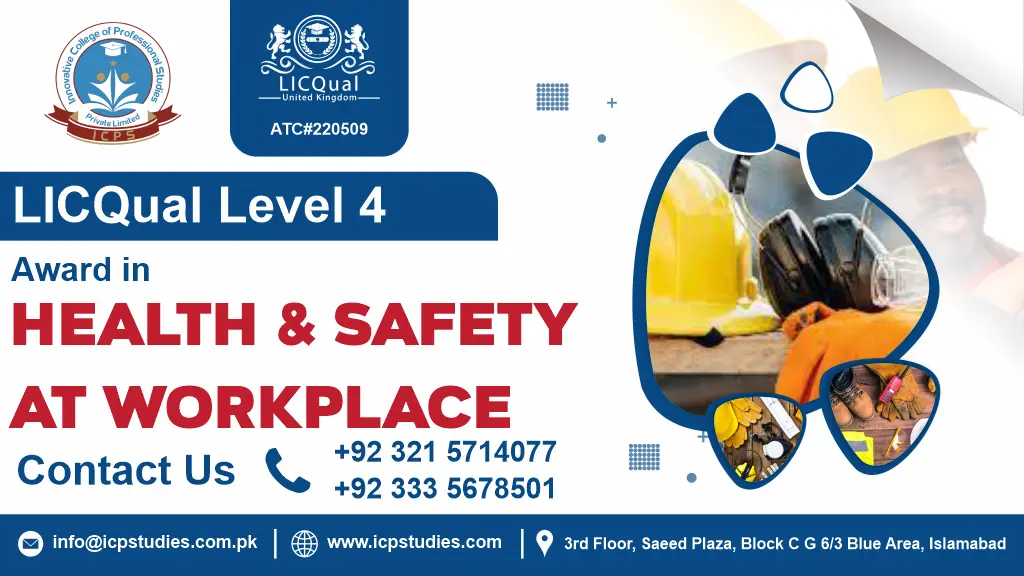LICQual is renowned for its commitment to excellence in education and training. With a track record of producing highly skilled professionals across various industries, LICQual certifications are trusted by employers globally. The Level 4 Award in Health and Safety at Workplace is no exception. It’s designed to equip individuals with the knowledge and skills needed to ensure a safe and healthy working environment.
The curriculum is meticulously crafted to cover all aspects of health and safety management, including risk assessment, hazard control, legislation compliance, and emergency preparedness.
Unlike some theoretical certifications, the Level 4 Award emphasizes practical application. Participants learn how to implement health and safety measures effectively in real-world scenarios, ensuring tangible results.
LICQual certifications are recognized and respected by employers worldwide. Holding a Level 4 Award demonstrates a commitment to excellence in health and safety management, making individuals stand out in a competitive job market.
Whether you’re looking to advance in your current role or pursue new opportunities, holding a Level 4 Award can open doors. Employers prioritize candidates with demonstrated expertise in health and safety, making this certification a valuable asset for career growth.
the LICQual Level 4 Award in Health and Safety at Workplace is a game-changer for individuals and organizations alike. With its comprehensive curriculum, practical approach, and global recognition, it’s the gold standard in health and safety certification.. Enroll now
All About Level 4 Award in Health and Safety at Workplace
Course Overview
The Level 4 Award covers a wide range of topics essential for ensuring a safe and healthy working environment. Participants delve into areas such as risk assessment, hazard identification, control measures, emergency preparedness, and compliance with health and safety legislation. Through a combination of theoretical learning and practical exercises, students gain a deep understanding of how to identify potential risks, implement preventive measures, and respond effectively to emergencies.
One of the key features of the Level 4 Award is its focus on practical application. Participants are encouraged to apply the concepts learned in real-world scenarios, enabling them to develop hands-on experience and critical thinking skills. This practical approach not only enhances learning outcomes but also ensures that graduates are well-prepared to tackle the challenges of health and safety management in diverse workplace settings.
The course is suitable for a wide range of professionals, including health and safety managers, supervisors, team leaders, human resources professionals, and facilities managers. Whether you’re looking to advance in your current role or pursue new career opportunities, holding the LICQual Level 4 Award demonstrates your commitment to excellence in health and safety management and enhances your credibility in the eyes of employers.
Upon successful completion of the course and assessment, participants receive the LICQual Level 4 Award in Health and Safety at Workplace, a globally recognized certification that signifies expertise in this critical area. With its comprehensive curriculum, practical focus, and industry relevance, the Level 4 Award equips individuals with the tools they need to create safer, healthier, and more productive workplaces.
In summary, the LICQual Level 4 Award in Health and Safety at Workplace is a prestigious certification program that empowers professionals to take their health and safety management skills to the next level. Whether you’re a seasoned practitioner or just starting your journey in this field, this course offers invaluable knowledge and practical insights that will benefit you and your organization for years to come.
Study Units
Learning Outcomes
Here are the expected outcomes for each study unit:
- Introduction to Health and Safety at Workplace:
- Understand the importance of health and safety in the workplace.
- Identify common workplace hazards and risks.
- Recognize the benefits of effective health and safety management.
- Legal and Regulatory Framework for Workplace Health and Safety:
- Gain knowledge of relevant health and safety legislation and regulations.
- Understand legal responsibilities of employers and employees.
- Learn how to ensure compliance with applicable laws and standards.
- Hazard Identification and Risk Assessment:
- Develop skills to identify workplace hazards.
- Understand the process of risk assessment and evaluation.
- Learn how to prioritize risks and implement control measures.
- Implementing Control Measures:
- Learn various methods for controlling workplace hazards.
- Understand the hierarchy of control measures.
- Develop strategies for implementing and monitoring control measures effectively.
- Health and Safety Management Systems:
- Gain knowledge of different health and safety management systems.
- Understand the principles of effective safety management.
- Learn how to develop, implement, and maintain a health and safety management system.
- Health and Safety Audits and Inspections:
- Learn the purpose and benefits of health and safety audits and inspections.
- Understand the process of conducting audits and inspections.
- Develop skills to identify non-compliance issues and corrective actions.
- Incident Investigation and Reporting:
- Learn the importance of incident investigation in preventing future accidents.
- Understand the process of conducting thorough incident investigations.
- Develop skills to analyze root causes and implement preventive measures.
- Communication and Training for Health and Safety:
- Gain knowledge of effective communication techniques for promoting health and safety in the workplace.
- Understand the importance of training in ensuring employee awareness and competence.
- Learn how to develop and deliver effective health and safety training programs.
- Emergency Planning and Response:
- Develop emergency response plans for various workplace scenarios.
- Understand roles and responsibilities during emergencies.
- Learn how to effectively communicate and coordinate emergency response efforts.
- Promoting a Positive Health and Safety Culture:
- Understand the importance of fostering a positive safety culture.
- Learn strategies for promoting employee engagement and participation in health and safety initiatives.
- Develop skills to lead by example and cultivate a culture of continuous improvement in health and safety practices.
Admission Criteria
Entry requirements for the LIQual Level 4 Award in Health and Safety at Workplace typically include:
- Minimum Age: Candidates must be at least 18 years old at the time of enrollment.
- Educational Qualifications: While there are no specific academic requirements, a basic level of literacy and numeracy is essential to comprehend course materials and participate effectively in assessments.
- Work Experience: Although not mandatory, candidates with relevant work experience in health and safety management or related fields may benefit from prior knowledge and practical insights. This could include roles such as health and safety officers, supervisors, team leaders, or managers.
- Language Proficiency: Proficiency in the language of instruction (usually English) is essential to comprehend course materials, participate in discussions, and complete assessments. Candidates may be required to provide evidence of language proficiency through standardized tests or other means.
- Commitment and Motivation: Successful completion of the course requires dedication, commitment, and a genuine interest in health and safety management. Candidates should be motivated to learn and willing to actively engage with course materials and activities.
- Access to Resources: Candidates should have access to the necessary resources, including a computer with internet access, to participate in online learning activities, access course materials, and communicate with instructors and fellow students.
- Health and Safety Requirements: Candidates should be physically and mentally capable of fulfilling the requirements of the course, including attending training sessions, participating in practical exercises, and adhering to health and safety protocols.
- Compliance with Entry Procedures: Candidates must complete all necessary application procedures, including submitting required documents, paying course fees, and meeting any other administrative requirements set forth by the training provider.
It’s important for prospective candidates to review the specific entry requirements outlined by the training provider offering the LIQual Level 4 Award in Health and Safety at Workplace, as these may vary depending on the institution and jurisdiction. Additionally, candidates should consider any additional prerequisites or recommendations provided by the training provider to ensure they are adequately prepared for the course.
Ideal Candidate
this course is ideal for:
- Health and Safety Managers: Experienced professionals responsible for overseeing health and safety programs and ensuring compliance with regulations in their organizations.
- Supervisors and Team Leaders: Individuals who supervise teams or departments and are accountable for maintaining safe working conditions and promoting a positive safety culture.
- Human Resources Professionals: HR professionals involved in developing and implementing health and safety policies, procedures, and training programs within their organizations.
- Facilities Managers: Professionals responsible for managing facilities and infrastructure, including identifying and addressing health and safety hazards within the workplace environment.
- Safety Officers and Advisors: Those in roles dedicated to health and safety, including safety officers, advisors, coordinators, or consultants, seeking to deepen their knowledge and skills in the field.
- Occupational Health Professionals: Professionals working in occupational health, including occupational health nurses, physicians, or practitioners, who require a comprehensive understanding of workplace safety practices.
- Regulatory Compliance Officers: Individuals responsible for ensuring compliance with health and safety regulations, standards, and guidelines relevant to their industry or jurisdiction.
- Risk Managers: Professionals involved in risk management processes who require a thorough understanding of health and safety risks and mitigation strategies.
- New Entrants to Health and Safety Roles: Individuals transitioning into health and safety roles or starting their careers in this field who seek foundational knowledge and skills to excel in their roles.
- Anyone with Health and Safety Responsibilities: Individuals with any level of responsibility for health and safety within their organizations, regardless of job title or industry, who wish to enhance their understanding and effectiveness in managing workplace safety.
Regardless of their specific roles or industries, participants in the LIQual Level 4 Award in Health and Safety at Workplace share a common goal: to create safer and healthier work environments for themselves and their colleagues. This course provides them with the essential knowledge, skills, and tools to achieve that goal effectively.
FAQs about Level 4 Award in Health and Safety at Workplace







